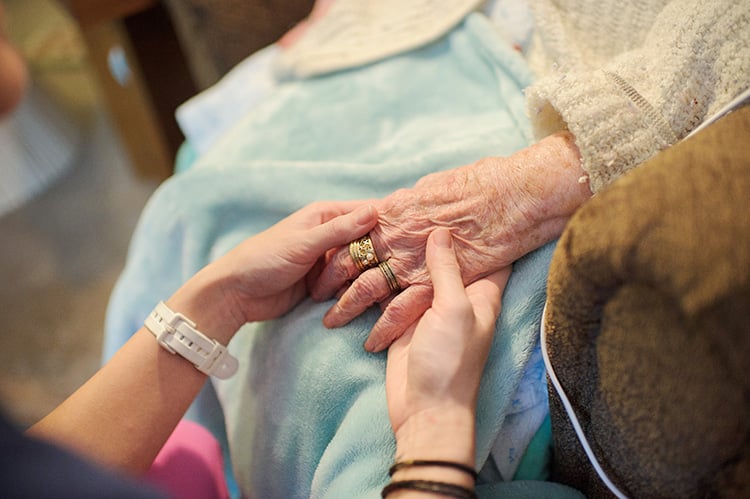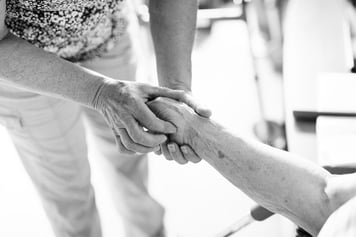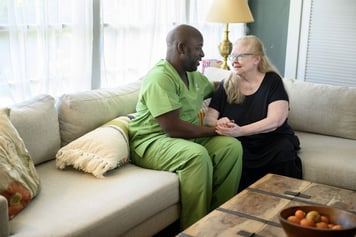Is there such thing as a “good death?” Experts say yes. Just as you can have a good life, you can have a good death. And it’s a final experience worth thinking about, not only for your own sense of completion but also for your family’s ability to grieve and live on. For most of us, a good death doesn’t just happen. Like anything worth doing, it takes planning.
What Is a Good Death?
 Most experts agree a “good” death is one that aligns with the person’s wishes and values. Beyond this, the definition of a good death is different for everyone. “Death is as unique as our fingerprints,” says Kimberly Paul, author of Bridging the Gap: Life Lessons From the Dying. Paul worked in hospice for 17 years and now speaks across the U.S. on her Live Well, Die Well tour, inspiring people to talk about and plan for their own deaths.
Most experts agree a “good” death is one that aligns with the person’s wishes and values. Beyond this, the definition of a good death is different for everyone. “Death is as unique as our fingerprints,” says Kimberly Paul, author of Bridging the Gap: Life Lessons From the Dying. Paul worked in hospice for 17 years and now speaks across the U.S. on her Live Well, Die Well tour, inspiring people to talk about and plan for their own deaths.
For some, dying well means being home, surrounded by loved ones, often with the support of hospice care. For others, it means being treated in a hospital with all possible life-preserving measures. Although there is no single definition of a good death, research shows a few common threads in what people want:
- Being able to decide how they want to die (e.g., having their wishes respected, deciding who will be with them as well as where they die)
- Minimizing pain and suffering
- Receiving support to address their emotional and spiritual well-being (e.g., having their spiritual practices fulfilled)
People also report caring about dignity, quality of life, a sense of completeness and having family present. Studies show dying people have different priorities than their family members and healthcare providers. That’s why it’s important to find out what each individual considers a good death, so their wishes can be honored.
[action 1]
Steps to Take Now to Die Well
Start Thinking About it Now
We plan for so many life events, including some that never even happen. Death is a certainty. So why not plan for it just as we do with birth and most other major milestones in our lives? “Don’t be blindsided by your death,” says Paul, who recommends starting to think about what a good death means to you in your 40s.
Live Well
How you live has a major impact on how you die. “One of the most tragic things I see is people who are healthy and alive but part of them is dying every day, whether that’s from anger, resentment or a dead-end job,” says Paul. “Then I see many seriously ill people who are living full lives.”
When you look back, will you be at peace with how you lived? “To me, living well means I made my life about connection with other human beings,” says Paul, who walked away from a six-figure salary to represent one of the most vulnerable populations in the country – the ill and dying. “We are all going to die, but none of us want to be on our deathbed and realize we never lived.”
Know What Matters Most to You
Is it time with family, or a hobby you love? Make time for the things you care about most. Connect with the people you love and let go of grudges and estrangements. Contribute to a cause that’s meaningful to you. One change Paul has made is spending less money on material possessions and more on experiences. “Few people find meaning in owning stuff at the end of life, but experiences – those will be with us wherever we go next.” Thinking about your priorities now, and savoring the moments, can help you minimize regrets later.
Share Your Wishes
Your loved ones need to know what you want to happen – and don’t want to happen – in a medical emergency. For example, do you want your medical team to do whatever it takes to keep you alive? Or would you rather stop treatment if it isn’t likely to improve your outcome or would make life extremely difficult? What is the type of life you value?
Quality conversations start with being connected to the people closest to you. “If you don’t have connection, you can’t have the hard conversations about death, life and loss,” says Paul. There are books and games that can help with these conversations and lighten the mood.
Find an Advocate
This person should understand and agree to defend your wishes if you can’t speak for yourself. Talk to them about your medical preferences as well as practical things like bank accounts and life insurance. This frees loved ones to focus on grieving rather than handling logistics after you die.
Put it in Writing
Even if you’ve talked about your preferences, fill out an advance directive. This is a written statement of your wishes regarding medical treatment. Your loved ones’ word alone is not enough to change your medical team’s legal imperative to preserve life at all costs. Advance directives not only ensure your wishes are honored, but they spare your loved ones from having to make difficult decisions in a time of crisis.
With an advance directive, the person you designate speaks “as you, not on behalf of you, which takes away a lot of the fear and pressure,” says Paul. “There is no choice – they just have to do what you would do.” The more they hear your voice saying what you want, the more comfortable your loved ones will be implementing the plan even in stressful times.
Ask Questions
Healthcare providers are trained to cure illness. They typically view death as a medical event. But death is also an emotional and spiritual experience. There may be times when you need to ask difficult questions like “What will life be like after this procedure?” and “What are my other options?” so you can make a decision that’s right for you.
Accept That Your Plan is a Work in Progress
Even if you think you know what a good death is to you, leave room to change your mind. It’s a lot like planning a birth. “You may want a natural birth and then scream ‘Epidural!’ when the pain hits,” says Paul. “And that’s okay. You can know what you want without knowing what you’ll actually choose when the time comes.” Your plan should be a work in progress you revisit daily, monthly or annually.
It takes courage to face our fears and talk about death. You don’t have to have answers. You don’t have to come to terms with death long before it happens. But if you start planning now, you can set yourself up for a good death – and give your loved ones comforting memories, peace as they grieve, and the inspiration to live well and die well too.
What is a good death to you? If it includes dying at home with the best quality of life possible, hospice may be a good choice for you. Call an Amedisys care center near you to learn more.




